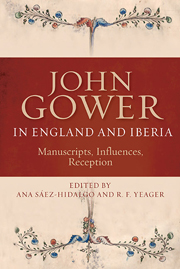Book contents
- Frontmatter
- Contents
- List of Illustrations
- Abbreviations
- Introduction
- I Manuscripts
- II Iberia
- III The Classical Tradition
- IV Economy
- V Reception
- 16 The Long and the Short of It: On Gower's Forms
- 17 “Al université de tout le monde”: Public Poetry, English and International
- 18 Buying Gower's Confessio Amantis in Modern Times
- 19 Gaps and Silences in the Reception of John Gower in Franco's Spain
- Notes on Contributors
- Bibliography
- Index
19 - Gaps and Silences in the Reception of John Gower in Franco's Spain
from V - Reception
Published online by Cambridge University Press: 05 August 2014
- Frontmatter
- Contents
- List of Illustrations
- Abbreviations
- Introduction
- I Manuscripts
- II Iberia
- III The Classical Tradition
- IV Economy
- V Reception
- 16 The Long and the Short of It: On Gower's Forms
- 17 “Al université de tout le monde”: Public Poetry, English and International
- 18 Buying Gower's Confessio Amantis in Modern Times
- 19 Gaps and Silences in the Reception of John Gower in Franco's Spain
- Notes on Contributors
- Bibliography
- Index
Summary
One of John Gower's most celebrated heroines, Constance, in one of her hazardous sea voyages, came to the coast of Spain near a Saracen's castle. There, a Moorish knight boarded the boat at night and tried to rape her. Our resourceful Constance prayed for help and God answered her prayer. A strong wind came up, blew the rapist away to drown in the bay and drove her boat out to sea. The poem in which this story appeared, the famous Confessio Amantis, also came to Spain a few years after the story was written, although its fortunes were not so dramatic or bleak. The Spanish translator Juan de Cuenca treated Gower's collection of tales with respect and wrote a Castilian prose version of the poem in the first half of the fifteenth century. Although an edition of this translation was published by Adolf Birch-Hirschfeld in Leipzig in 1909, there is a big silence about Gower in twentieth-century Spain until Elena Alvar's edition appeared many years later, in 1990. One wonders why there were no other editions or reprints of Confessio Amantis available during most of the twentieth century. Is this silence due to lack of interest among Spanish editors, publishers or scholars? If so, why? Had Gower's work encountered difficulties going through the filter of the strict religious, moral, and political censorship that was established by General Franco's regime (1939–75)?
- Type
- Chapter
- Information
- John Gower in England and IberiaManuscripts, Influences, Reception, pp. 291 - 298Publisher: Boydell & BrewerPrint publication year: 2014



